ルワンダの虐殺を学ぶのにおすすめの参考書7作品~目を背けたくなる地獄がそこにあった…
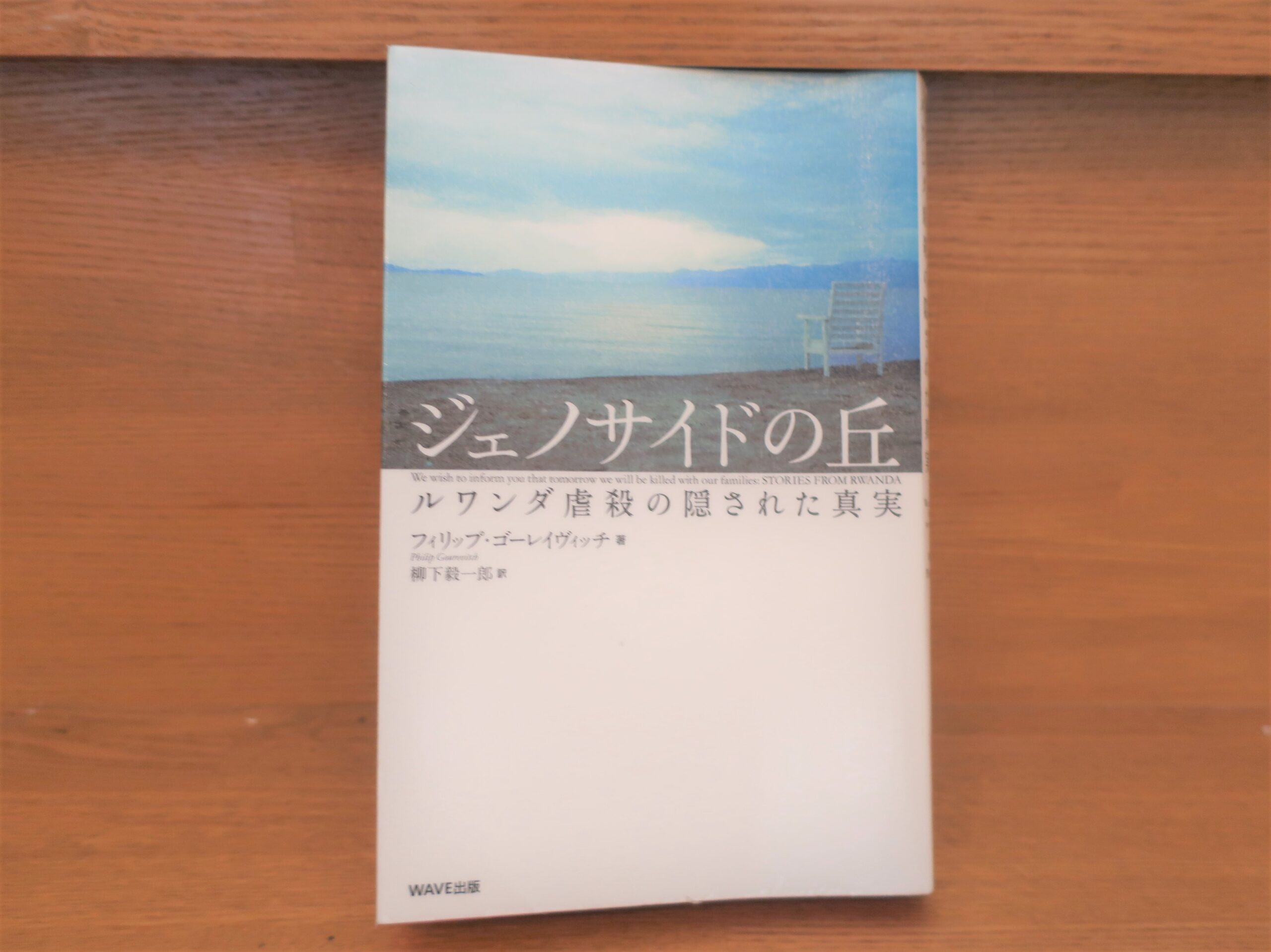
ルワンダの虐殺について学ぶのにおすすめの参考書7作品~あまりに悲惨な出来事…地獄はまさにそこにあった…
私は2019年にボスニア・ヘルツェゴビナを訪れ、そこでボスニア紛争について学ぶことになりました。紛争を経験したガイドさんの声を聴き、私は地獄のような民族紛争の実態を知ることとなりました。特にスレブレニツァという地を訪れた時のショックは忘れられません。
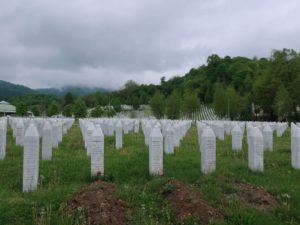
そして帰国から数年後、私は「冷戦世界の歴史、思想、文学に学ぶ」をテーマにブログ更新を続けていました。
その流れで共産圏崩壊に伴って起きたボスニア紛争も改めて取り上げたのですが、その過程で私はこれから紹介するルワンダの虐殺についても知ることとなったのです。
ルワンダの虐殺もボスニア紛争とほぼ同時期に起きた虐殺です。 長有紀枝著『スレブレニツァ―あるジェノサイドをめぐる考察―』にルワンダの虐殺のことが述べられていました。これらは紛争や虐殺が起こった背景や、それを防ぐことができなかった国際機関のメカニズムが非常に似ています。ボスニア紛争、スレブレニツァの虐殺の理解を深めるためにもこれはぜひ重要と感じ、私はルワンダの虐殺について学ぶことにしたのです。
この記事で紹介する本は正直かなり重いです。ですがここで改めて人間とは何か、なぜ虐殺は起こってしまうのかということを考えることは非常に大きな意味があるのではないかと私は感じています。ぜひおすすめしたい作品たちですのでじっくり読んで頂けましたら幸いです。
では、早速始めていきましょう。
フィリップ・ゴーレイヴィッチ『ジェノサイドの丘 ルワンダ虐殺の隠された真実』
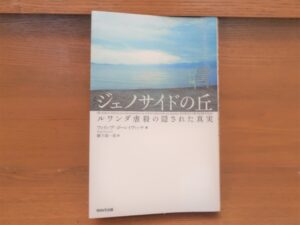
まずはじめに申し上げます。この本はあまりに衝撃的で、私は心底参ってしまいました ボスニア紛争やスレブレニツァを学ぶ流れで手に取ったこの本でしたが、あまりの悲惨さに言葉を失ってしまいました・・
あなたはルワンダという国の名前を聞いたことがあるだろうか?それが世界地図のどこにあるかご存じだろうか?
ぼくは知らなかった。わずか十年前にその国がかつて見たことがないような苛烈な大虐殺を経験し、国が崩壊に追いこまれたことも知らなかった。ジェノサイド=民族虐殺は周到に準備されており、加害者たちだけでなく被害者たちまでもが起こるのを待ちかまえていたというのも知らなかった。国連をはじめとする国際社会はみなジェノサイドが起きていると知りながら、介入したくないために百万人を見殺しにしたことも知らなかった。(中略)
本書はアフリカの小国で起きた民族虐殺についてのルポルタージュである。一九九四年四月六日、ルワンダの首都キガリで、独裁者ハビャリマナ大統領と隣国ブルンディのヌタリャミラ大統領が乗った飛行機が撃墜された。休戦中だった反政府勢力RPFと政府軍との戦いが再燃し、混乱の中で多数派フツ族は少数派ツチ族を虐殺した。その数は八十万人、ルワンダ人口のほぼ一割に当たる。世間で流通している話はこんなところだ。だが、これはルワンダ虐殺の恐怖を百分の一も伝えていない。そもそも人口八百万人の国で八十万人が殺されるというのはどういうことなのか。虐殺がはじまる前、殺人者と犠牲者は隣りあって暮らしていた。フツ族とツチ族の結婚も当たり前のことだった。にもかかわらず、ある日殺害がはじまると、殺人者たちは山刀と釘を埋め込んだバットを手に、隣人を、親戚を、商売相手を殺していったのである。あまりにも多くの人が、あまりにも簡単に殺人者となることを選んだ。
WAVE出版、フィリップ・ゴーレイヴィッチ著、柳下毅一郎訳 『ジェノサイドの丘 ルワンダ虐殺の隠された真実』 P483-484
たった数か月足らずで少数民族であるツチ族80万人が虐殺された。
しかもその虐殺の方法があまりに残虐でした。銃による殺害ではなく、上の解説にもありますように山刀(マチェーテ)で切り刻むという、極めて原始的な方法での殺害でした。

しかもこの本を読めばわかりますが、単に殺害するだけでなくゆっくりと苦しめて殺すため、あえて急所を狙わず、手足を切断したり脚の腱を切ったまま放置し、犠牲者が苦しむ様を虐殺者は楽しんでいました
そしてさらに恐ろしいことに、こうした虐殺を行ったのが一部の人間なのではなくフツ族の大多数が殺害に加わり、ほぼすべての人が何らかの形で虐殺に関わるという異常な状況でした。
この本ではそんな悲惨な虐殺がなぜ起こったのか、そしてどのような経緯で行われていったのかが語られます。
また、この本で特徴的なのはタイトルにもありますように、これまで世界で無視され続けていたルワンダの悲劇の実態を告発する点にあります。平和維持のために介入していたはずの国連はなぜ虐殺を止められなかったのでしょうか。そしてさらに衝撃的なのは、国連を含め世界各国は虐殺をしていたフツ族側に支援物資を送っていたという事実すらあったこと・・・これには絶句しました・・・
読んでいて本当に心が痛みます・・・というより、具合が悪くなってきます。それほどショッキングで恐ろしい事実が語られます。
そしてこの本は出版社さんもかなり力を入れて出版された本だと思われます。
というのも、この写真を見て下さい。
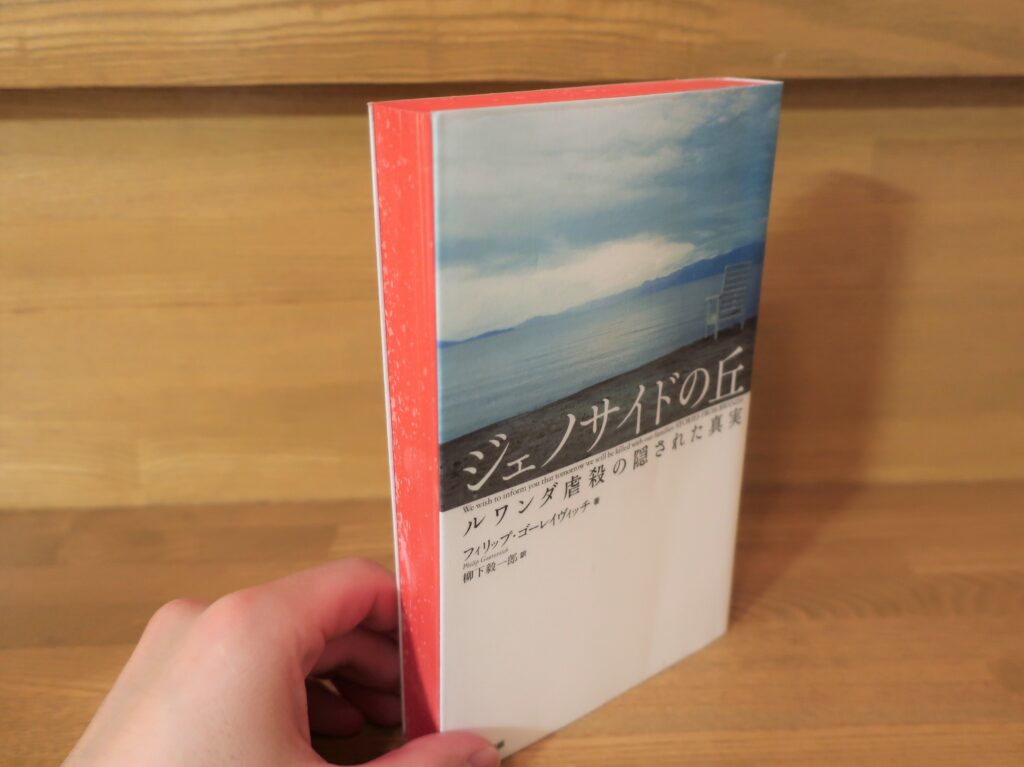
わかりますでしょうか?本のページが赤く染められているのです。しかも単に真っ赤にしているのではなく、よく見てみると染みのようなムラがあるのです。そうです、まさに血で染まったかのように・・・ 正直、こんな本は初めて見ました。出版社さんの並々ならぬ思いが伝わってきます。
衝撃の一冊です。ぜひおすすめしたいです。
P・ゴーレイヴィッチ『ジェノサイドの丘 ルワンダ虐殺の隠された真実』信じられない惨劇がアフリカで起きていた・・・
Amazon商品ページはこちら↓
レヴェリアン・ルラングァ『ルワンダ大虐殺 世界で一番悲しい光景を見た青年の手記』
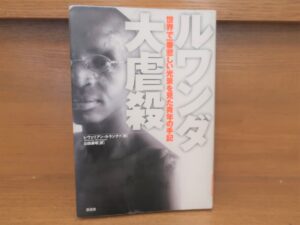
この本は尋常ならざる本です。普通の歴史の本とは違います。事実の流れを追って解説していく本ではありません。ジェノサイドを経験した著者の実体験とその魂の内奥がここに記されています。あまりにショッキングで読んでいて血の気が引くような感覚になりました。
彼は目の前で残酷なやり方で家族を殺されました。そして彼自身も鉈で片腕を切断され、片目をえぐられ、生きているのも不思議な傷を受けました。そんな著者が語る壮絶なジェノサイドの現実をこの本では見ていくことになります。
この本の中で特に印象に残ったのは「殺戮者たちは、赤ん坊二人を教会の薔薇色の壁にぶつけて頭蓋骨を割った後、子供の血の海に母親の顔を浸してから、母親を殺した」という描写です。
ルワンダはキリスト教が熱心に信仰されていた国でした。教会ではフツ族、ツチ族が一緒にお祈りをしていました。しかしまさにその教会で殺戮が行われ、殺戮が終わった後には彼らは何事もなかったかのように神に祈りを捧げていたのです。
神とは殺戮を犯した者を赦す存在なのでしょうか?なぜ犠牲者は苦しみ、絶望のまま死ななければならなかったのでしょうか。なぜ赤子は母親の目の前で、しかも教会で殺されなければならなかったのでしょうか。
これはドストエフスキーを読まれた方にはきっとぴんと来るかと思います。これは『カラマーゾフの兄弟』で語られる残虐行為と非常に似ています。
神がいるのになぜこんな虐殺行為があるのだろうか。なぜ神はこんな悪を放っておかれるのか。 ドストエフスキーは神への反逆を試みるイワンの口を通して、そんな神への疑問を作中で展開していきます。この本の著者ルアングァもまさしくそんな問いや怒りをこの本で記しています。
なぜ神はこの残虐をお認めになるのか。なぜ被害者は救われず、殺戮者はのうのうと生きながらえているのか。なぜ被害者が彼らを赦さなければならないのか。目の前で親類を残虐に殺されたのに、そんなことができるとでも言うのかと著者は苦しみながらこの本を書いています。
実際、著者のルラングァはこの本の第9章「暗闇の三日間」のエピグラフにドストエフスキーの『カラマーゾフの兄弟』に出てくる「たった一人の子供が流す、たった一粒の涙を償えるものなどない」という言葉を引用しています。
ドストエフスキーを意識してこの本を書いたのか、それとも彼の悲惨な体験がドストエフスキーへと自然と繋がっていったかはわかりません。 ですが著者の想像を絶する苦しみや絶望、怒りが圧倒的な迫力で伝わってきます。 凄まじい本です。ぜひ読んで頂けたらなと思います。
神はなぜ虐殺から救ってくれなかったのか…『ルワンダ大虐殺 世界で一番悲しい光景を見た青年の手記』
Amazon商品ページはこちら↓
ポール・ルセサバギナ『ホテル・ルワンダの男』
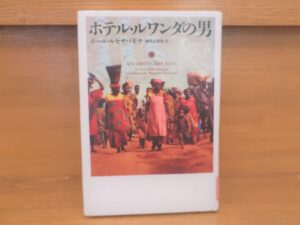
この本は映画『ホテル・ルワンダ』のモデルになったポール・ルセサバキナが自らの体験を綴った作品です。
映画では作品制作の都合上脚色などもあり、事実そのままではありませんが、彼が1200人もの人を危険を承知で匿い、その命を救ったのは事実です。
この本ではそんな彼の体験が詳しく語られることになります。
敵対者と暴力や憎しみで向かい合うのではなく、言葉を尽くして相手と話し合い、妥協点を探り穏便に切り抜けるその機転や精神力には読んでいて驚くしかありません。 この本も一気に読んでしまいました。この本もルワンダの虐殺を知る上で非常に貴重な一冊です。
なぜ人々はあっという間に虐殺者に変わってしまったのか。 著者はその原因を「言葉」だと言います。さあ、これはどういうことなのでしょうか。私は著者の次の言葉に非常に強い印象を受けました。
「ラジオ局のアナウンサーによって発せられた言葉が暴力の最大の引き金となった。ラジオは一般市民に対して、ツチ族の隣人宅へ押し入り、その場で住民を殺害することを公然と奨励していた。そうした指示は誰にでもわかるような暗号で表現された。
『背の高い木を切れ。近隣を清掃せよ。義務を果たせ』
標的の住所と名前が電波の上で読み上げられた。逃げ出す者があれば、それが実況放送され、聴衆はスポーツの試合のようにラジオの向こうの追跡劇に耳を傾けた。民族的優位を称え、為すべき仕事を果たすよう人々に訴えかけた数々の言葉は、三ケ月間にわたってルワンダに信じがたい現実を作り上げた。」
私はこの箇所を初めて読んだ時、鳥肌が立ちました。 私は伊藤計劃さんの『虐殺器官』を連想してしまったのです。ラジオ局から流れる虐殺の言葉が人々を駆り立てた・・・ 伊藤計劃さんがこの本を読んでいたかどうかはわかりません。ですが、『虐殺器官』ではこうした虐殺が何度も語られることになります。これはかなり衝撃でした。詳しくは、この作品を読めばわかります!おすすめです!
映画でも有名!『ホテル・ルワンダの男』アフリカのシンドラーと呼ばれた男の物語
Amazon商品ページはこちら↓
ジャン・ハッツフェルド『隣人が殺人者に変わる時―ルワンダ・ジェノサイド生存者たちの証言』
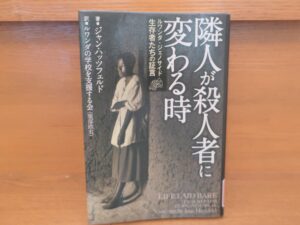
ルワンダのニャマタという町では4月11日から虐殺が 始まり、地獄のような状況の中生存者は逃亡を続けたのでありました。そして最終的に、この一か月ほどの間に五万人の犠牲者が出ることになります この本ではその生存者の言葉を聞くことができるのですが、読んでいて具合が悪くなるほどの地獄でした。
この本は 「隣人が殺人者に変わる時」三部作の第一作目に当たります。 続編の『隣人が殺人者に変わる時 加害者編』 と『隣人が殺人者に変わる時 和解への道―ルワンダ・ジェノサイドの証言』もこれまた強烈です。いや、むしろ進めば進むほど恐ろしさは増していきます。 この三部作はとにかく衝撃的です。
平和とは何か。人間とは何か。罪と罰とは。善と悪、神の問題。赦しの問題。 人間における根本の問題がここに詰まっています。答えはありません。ですが、極限状態に生きた人たちの声がここにはあります。その声に耳を傾け、自分は何を思うのか。これは非常に重要なことだと思います。
ぜひおすすめしたい作品です。
衝撃の三部作!ルワンダ虐殺の実態『隣人が殺人者に変わる時 ルワンダジェノサイド 生存者たちの証言』
Amazon商品ページはこちら↓
隣人が殺人者に変わる時―ルワンダ・ジェノサイド生存者たちの証言
ジャン・ハッツフェルド『隣人が殺人者に変わる時 加害者編』
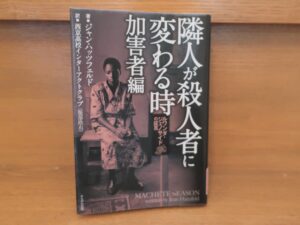
前回紹介した『隣人が殺人者に変わる時―ルワンダ・ジェノサイド生存者たちの証言』ではルワンダの虐殺の生存者のインタビューが収められていましたが、この作品ではそれとは逆に加害者の声を聞くことになります。
正直、読んでいて暗い気持ちになり、胸がむかむかしてきます・・・被害者は全てを失い、生き残った者も絶望的な苦しみを味わい続けています。しかし、それに対し加害者側はどうなのか。この本ではそれを知ることになります。
「生き地獄を体験し、身内も財産も社会に対する信頼も奪われた生存者の証言と比べて、殺人者の告白はあまりにも軽い」という訳者の言葉は私にとっても非常に印象深いものでした。
そしてこの本を通して私が感じたのは「赦し」とは何なのかということでした。 いくら加害者が謝罪したところで、亡くなった方はもう帰ってきません。生き残った方の心の傷や生活も元通りになるわけがありません。 ですが、加害者は「自分のこれからの生活のため」に被害者に赦しを求めます。
しかも、真に心から悔やんでいるとは到底思えない態度で「赦してくれ」と被害者に求めるのです。そして彼らはほとんど裁かれることなく釈放され、今まで通りに生活を始めるのです。 これは読んでいて精神的にかなり苦しかったです。
そして一番強烈だったのは、これほどの悪を犯した者自身が『自分たちには「赦し」が与えられなければならない』『新しい生活をしたい』と無邪気に言えてしまうその恐ろしさでした。 この「赦し」の問題については以前紹介した『ルワンダ大虐殺 世界で一番悲しい光景を見た青年の手記』でも出てきました。
家族を目の前で惨殺され、自身もなぜ生きているかわからぬような傷を負いながらも生き延びたルラングァ氏は「彼らを赦すことはできない」と述べていました。なぜあんな悪行を犯した人間がのうのうと街で生きているのかと怒りをにじませていました。
「赦し」とはそもそも何なのでしょうか。 そもそも誰が誰に対してするものなのでしょうか。被害者?法?国家?神? 加害者が赦されるというのはどういうことなのか。逆に永遠に罰せられ苦しめられることこそ償いなのでしょうか。
この本を読んでいると頭が混乱しぐるぐるしてきます。 この『隣人が殺人者に変わる時』の三部作はあまりに強烈な作品です。 前回の作品に引き続きぜひ手に取って頂きたい作品となっています。
加害者は虐殺後何を語るのか『隣人が殺人者に変わる時 ルワンダ・ジェノサイドの証言 加害者編』
Amazon商品ページはこちら↓
ジャン・ハッツフェルド著 『隣人が殺人者に変わる時 和解への道―ルワンダ・ジェノサイドの証言』
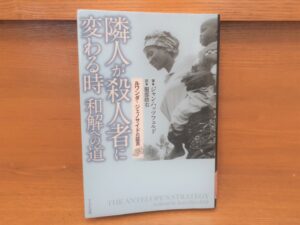
この本は『隣人が殺人者に変わる時』三部作の最後を飾る作品です。ラストの作品にふさわしく、この本も凄まじい1冊です。個人的には三部作中最も印象に残った作品です。あまりに厳しい現実をこの本で突きつけられることになりました・・・
第一部では虐殺の生存者を、第二部で加害者側を、そしてこの第三部では両者に対しインタビューを試みます。というのも、上の解説にありますように、加害者側であるフツ族が国の復興のために釈放されることになり、ツチ族とフツ族がまた同じ場所で生活をするという状況が生まれてきたのでありました。
「こんなむごい歴史があり得るのか」 著者はそう述べます。 この三部作はそんな恐るべき歴史を現地に生きる人たちの言葉から見ていくことになります。 正直、こんなに強烈な本を読むことになるとは思ってもいませんでした。
スレブレニツァの虐殺を学ぶ過程で知ることになったルワンダジェノサイド。 この三部作と出会えてよかったなと心の底から思います。 精神的には非常に厳しい読書になりましたが、まったく悔いはありません。 少しでも多くの方にこの三部作が広まってくれたらなと思います。
虐殺者と共存する地獄~赦しとは一体何なのか『隣人が殺人者に変わる時 和解への道―ルワンダ・ジェノサイドの証言』
Amazon商品ページはこちら↓
隣人が殺人者に変わる時和解への道: ルワンダ・ジェノサイドの証言
マーク・ボウデン『ブラックホーク・ダウン―アメリカ最強特殊部隊の戦闘記録』
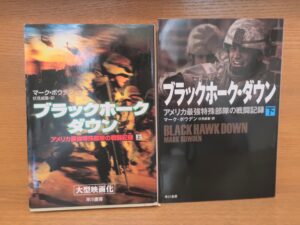
1993年10月3日、内戦が続くソマリアの首都モガディシュにアメリカ軍特殊部隊が空挺降下した。デルタ、レインジャー、SEAL、PJ(パラジャンパー)など陸・海・空軍の精鋭99名からなるこのタスク・フォースの任務は、国連の平和活動を妨害する武装組織アイディド派の最高幹部を拉致すること。順調に行けば一時間足らずで終わる簡単な作戦のはずだった。だが、ハイテク装備のブラックホーク・ヘリコプターが撃墜されたことから戦況は一変。生存者の救出に向かったアメリカ兵は数千の敵に包囲されて孤立し、水や食料、弾薬の不足に苦しみながら一昼夜にわたる壮絶な銃撃戦を繰り広げることに……。
冷戦後の国際政治の一大転換点となりながらも、今日まで語られることがなかった秘密作戦の全貌を再現するとともに、特殊部隊のもつ驚異的な戦闘能力を描いた戦争ノンフィクションの傑作!
Amazon商品紹介ページより
この作品はリドリー・スコット監督の大ヒット映画『ブラックホーク・ダウン』の原作となった作品です。
上で紹介したあらすじにもありましたように、世界最強の特殊部隊だったはずのデルタとレンジャーが激戦地で孤立し、絶望的な戦闘に巻き込まれるというのがこの作品の大きな流れです。
このソマリアでの戦闘は後のアメリカの軍事介入に大きな影響を及ぼすことになりました。
これまで当ブログでも紹介してきたボスニア紛争やルワンダの虐殺で国連の平和維持活動が機能不全に陥ったのもまさにこの事件の影響が非常に大きかったとされています。
それまでのアメリカや先進諸国は圧倒的な武力をもって介入すれば、発展途上国の紛争は簡単に鎮圧できると考えていました。しかしその楽観的な考え方が崩壊した事件こそこのブラックホークダウンだったのです。
この時点でルワンダの虐殺やスレブレニツァの虐殺の最終カウントダウンが始まっていたのかもしれません・・・
大ヒット映画の原作!ソマリアの惨劇『ブラックホークダウン アメリカ最強特殊部隊の戦闘記録』
Amazon商品ページはこちら↓
ブラックホ-ク・ダウン: アメリカ最強特殊部隊の戦闘記録 (上) (ハヤカワ文庫 NF 264)
おわりに
以上、7冊の本をここでご紹介しました。
何度も申し上げますように、ルワンダの虐殺はあまりに衝撃的です。トラウマになってもおかしくないほどの読書になるかもしれません。それほどの地獄です。人間はここまで残酷になれるのかと恐れおののくしかありません。
私はボスニア紛争をきっかけにルワンダの虐殺をこうして学ぶことになりましたが、これらの本を読んでいてボスニア、ルワンダ、ソマリアのそれぞれが特異で異常なのではなく、人間の本質としてそういうことが起こり得る、誰しもがやってしまいかねないものを持っているのだということを改めて思い知らされることになりました。
独ソ戦においてもC・メリデール著『イワンの戦争 赤軍兵士の記録1939-45』で、極限状態における人間性について私は学ぶことになりました。この本の中でもソ連兵の蛮行についての深い分析がなされます。人間の残虐性は人間そのものに根深く存在するものであり、社会的要因が整えばいとも簡単に人間は信じられない所業を犯してしまうことが暴露されます。普段は普通の人間として生きていても、人間はいつどうなるかわからないということをつくづく思い知らされます。
だからこそ「(7)源信の『往生要集』と現代の地獄巡り~なぜ戦争や弾圧、虐殺を学ばなければならないのか」の記事でお話ししたように、私は戦争や悲惨な虐殺の歴史を学んでいます。目を背けたくなるような歴史ではありますが、ここを通らなければ、歴史はまた形を変えて繰り返してしまうことでしょう。そうならないためにも私たちは悲惨な人間の歴史を学ばなければならないのではないでしょうか。
皆さんにとっても辛い読書になるかと思いますが、ぜひお手に取って頂けたらと思います。
以上、「ルワンダの虐殺を学ぶのにおすすめの参考書7作品~目を背けたくなる地獄がそこにあった…」でした。
関連記事
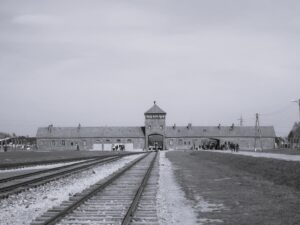
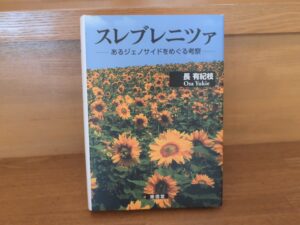
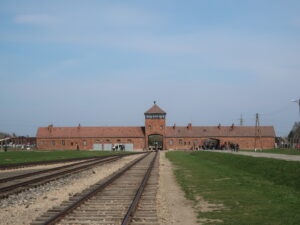
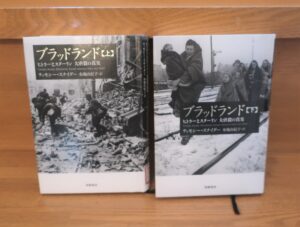
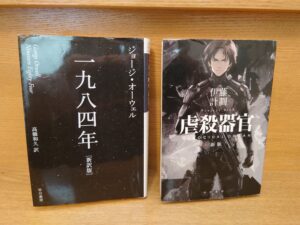







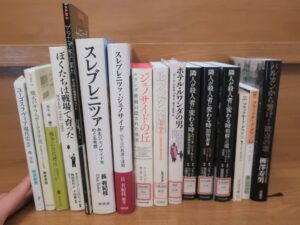
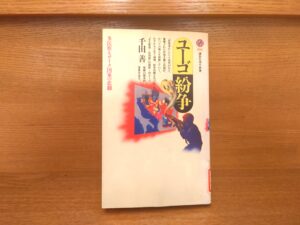

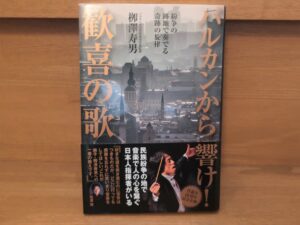
コメント